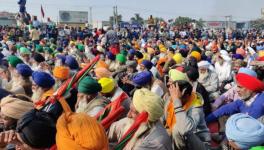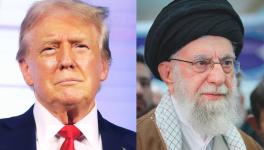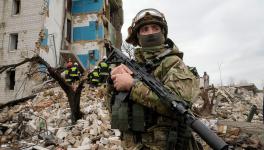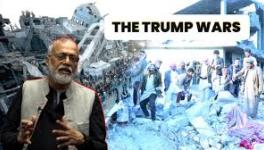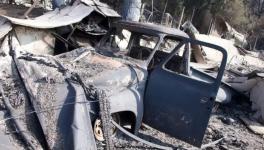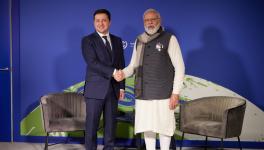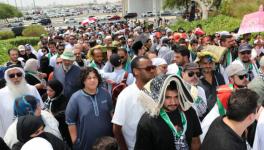The U.N. Security Council Should Sanction Saudi Arabia for Its War Crimes in Yemen
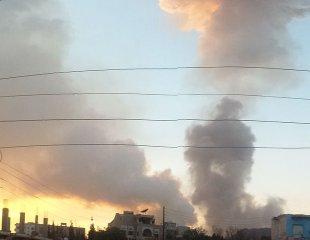
Air strike on Sana'a in May 2015. Photo Credit: Ibrahem Qasim/Wikipedia
One year ago, on August 9, 2016, Saudi Arabia’s air force bombed the Sana’a International Airport in Yemen. This salvo came as part of a broad assault on Yemen’s capital, Sana’a, which the Saudis have been bombing since 2015. The Ansarullah movement, the umbrella group that is dominated by the Houthis, holds Sana’a. The day after the bombings, Saleh al-Samad, who heads the Political Council of the Ansarullah movement, said that the Saudi strikes would create a catastrophe. Sana’a International Airport provided an essential lifeline for the civilian population of northern Yemen. Food and medical supplies came through the airport. These would now be halted as a result of the strikes.
A year later, 15 relief agencies joined together to condemn the destruction of the airport. ‘The official closure of Sana’a airport,’ they note, ‘effectively traps millions of Yemeni people and serves to prevent the free movement of commercial and humanitarian goods.’ Yemen’s Ministry of Health estimates that at least 10,000 Yemenis died from lack of access to the international medical treatment that they had sought. Each year, before the conflict, about 7,000 Yemenis traveled abroad annually for medical treatment. Many of them used Sana’a International Airport as their point of departure. They have now been trapped to die.
The 15 relief agencies note that more people have died because they have been denied access to international medical care than those killed by the fighting. These numbers, they point out, represent the 'hidden victims of the conflict in Yemen.’
One of these hidden victims is the father of Mutasim Hamdan, the Norwegian Refugee Council’s country director in Yemen. This relief organization was one of the 15 that signed the letter. Hamdan’s father, Mohammed, needed urgent medical care, which was not available in his wartorn country. ‘The only way to save my father’s life was to take him abroad,’ Mutasim Hamdan says. They traveled by road for 24 hours to Seiyun Airport to Sana’a’s east. ‘The doctors said that it was dangerous for him to travel all the way there, that he might die on the way, but it was our only option.’ Less than a day before he was to board his flight and after the terrible journey, Mohammed Hamdan died. ‘The journey was too much for my father,’ his son said.
Wael Ibrahim of Care International, another one of the signatories, said that the blockade is ‘collective punishment for people in Yemen.’ Ibrahim pointed out that the road to the other airports are dangerous, with armed men at checkpoints and with Saudi aircraft liable to bomb civilians in their cars. ‘It’s a rough journey,’ he said. Why has the airport remained closed for the past year? ‘There is no justification for the airport to close,’ said Care’s Ibrahim.
Matters are grave. Yemen is at the brink of cholera and famine driven mass death. There is little Western media coverage of this atrocity. Dr. Homer Venters of Physicians for Human Rights said that Yemen is the frontline for the ‘weaponization of disease.’ War crimes abound.
Medieval Siege
Meanwhile, the U.N. Security Council has been mute on the medieval siege that has throttled the lives of the Yemeni people. The U.N. has passed several Security Council resolutions, but none of these have condemned Saudi Arabia for its war and embargo, for essentially sending Yemen into genocide. Only in June 2017 did the president of the Security Council—Bolivia’s Ambassador Sacha Sergio Llorentty Solíz—encourage the installation of the cranes at Hudayadah port (bombed by the Saudis) and the reopening of Sana’a International Airport. There was no mention that the embargo against Yemen’s people is a violation of the free movement of people (article 13 of the Universal Declaration of Human Rights).
In January 2016, U.N. Secretary General Ban Ki-moon said of the condition in Syria, ‘The use of starvation as a weapon of war is a war crime.’ No such statement has been made against Saudi Arabia’s siege.
The U.N.’s Yemen humanitarian coordinator, Jamie McGoldrick, said recently that he is in touch with the Saudi government and its Yemeni allies. He has personally asked the Saudis to allow the airport to open to full capacity (currently only a few flights are allowed into the airport). The U.N. has asked the Saudis to allow one or two humanitarian flights to leave Sana’a each week. The airlift would go through Saudi Arabia, allowing the kingdom’s intelligence agents surveillance of the passengers. Even this was too much for Saudi Arabia. It was not allowed. ‘It’s like being caught up in a fortress mentality,’ McGoldrick said. ‘This has become a tactic of war in itself and I think it is really unfair.’ But it is more than unfair: It is a war crime.
In March, Ambassador Michele Sison, the U.S. Deputy Representative to the United Nations, who is a career State Department officer, pointed directly to the war and the siege as the reasons for the civilian deaths and the impending cholera as well as famine. ‘Constraints on access’ through the Hudayadah port and the Sana’a International Airport, she said, ‘contribute to the risk of famine. The closure of Sana’a airport, along with checkpoints on the ground, complicate relief efforts even more. Obstructions to aid in Yemen must be lifted.’
It is all very well to say so. But what comes next? Will the U.S. openly pressure the Saudis to allow humanitarian flights into and out of Sana’a International Airport? Will the U.S. decline to rearm Saudi Arabia as it continues to pummel Yemen, including Sana’a International Aiport and Hudayadah port? What does it mean to recognize that the siege is a war crime or at least ‘unfair’?
It is unlikely that the U.S. will stop its active support for the Saudi war. Paranoia about Iran’s role in Yemen stills the hand of the Trump administration. It has been suffocated by its one-dimensional view of Iran. A dramatic operation by Saudi and UAE-backed Yemeni forces against al-Qaeda strongholds in Yemen’s Hadhramaut region this week gives the war a new lease on life. It is as if the Saudi-backed forces are fighting not only al-Qaeda in Yemen, but also Iran. Trump—who strangely believes that Iran and al-Qaeda are on the same side—must view this with pleasure. Reality is far from his assessment. Saudi Arabia will get off scot-free. The monstrous anger of the guns will not cease.
Vijay Prashad is professor of international studies at Trinity College in Hartford, Connecticut. He is the author of 18 books, including Arab Spring, Libyan Winter (AK Press, 2012), The Poorer Nations: A Possible History of the Global South (Verso, 2013) and The Death of a Nation and the Future of the Arab Revolution (University of California Press, 2016). His columns appear at AlterNet every Wednesday.
This article was made possible by the readers and supporters of AlterNet.
Disclaimer: The views expressed here are the author's personal views, and do not necessarily represent the views of Newsclick.
Get the latest reports & analysis with people's perspective on Protests, movements & deep analytical videos, discussions of the current affairs in your Telegram app. Subscribe to NewsClick's Telegram channel & get Real-Time updates on stories, as they get published on our website.









